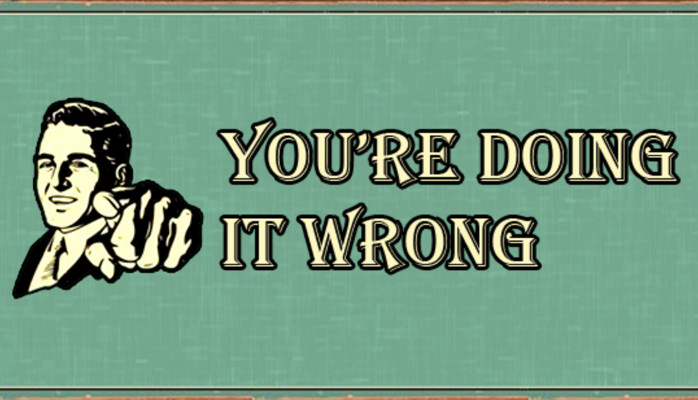
You're Doing It Wrong: "Thank You" notes...
I've interviewed a lot of candidates in the past few years and after receiving yet another lack-luster note, I thought it might be a good opportunity to share some of what I have learned with you. What I want to share is that, by and large, thank you notes are terrible and unoriginal. Here are 5 that I've gotten in the past 10 months:
They're all the same, and they're all so generic it's almost impossible to remember who these people are or what we talked about. If you can't remind me of those things, why would I care?
You spent 30 or more minutes trying to convince me that you were a good fit for this position. You can't take 5 more minutes to craft a note that reinforces that for me?
For the people who wrote the notes above, tell me what exactly you enjoyed learning about so much. Remind me of the unique skill set are you have that would make you a great fit for this job. Connect with me, don't just make this note a box you can check. Ask yourself, before you hit 'send' if what you wrote to me is really the best you can do. If the above is your example of your best, what exactly should I expect on a bad day?
Keep in mind, your competition is sending follow-up notes like this:
This person starts with a paragraph that is similar to the entirety of the previous notes - then they:
- Use the name of my company (redacted)
- Reference where they're working (redacted)
- Offer up references (nice touch)
- Provide a plan of attack by way of a 30-60-90 (above and beyond!)
- Talk to why they'd be a great addition to the team (great reminder)
You, my dear reader, don't know this, but some of the strengths they list were directly plucked from what I had mentioned in our interview as traits I am looking for in a candidate.
I interview a lot of people. Chances are, the person you're speaking with is interviewing a lot of people, too. Take every opportunity to connect with your interviewer.
Use this opportunity to remind them of the conversation, of who you are and of why you are a fit. Don't merely write you’re a fit. Write why they should hire you - and while you're at it, make sure the why syncs up with what they told you they're looking for in a candidate.
If it isn't obvious to you - these are the exact traits and skills that would make you a good sales person...or really...any kind of employee.
Finally - to the person who feels getting back to me quickly is of paramount concern: it's not. I've never thought, "Wow, what a spectacularly bad note - but at least it was fast!" Speed is important, but quality trumps it. Rather than sending me something 30 minutes after our conversation, take some time to reflect on our interaction and think about my answers to your questionsd what you need further clarity on. Consider if there are questions you wished you asked. Continue our dialogue.
I've never thought "Wow, what a spectacularly bad note - but at least it was fast!"
You have one opportunity to make a first impression with the interviewer. Use your follow up note as an opportunity to cement a great conversation, or salvage a mediocre one. I've changed my opinion on people based on the quality of that note.
Also, we're on LinkedIn, so I'll mention this: look up your interviewer(s). It's a great way of showing you did your homework. And while we're on homework (maybe the subject of another post) - do some. Do it on me, do it on my company. Do enough to have an opinion.
If you're not doing all of these things, you're doing it wrong.
.


Recruitment Consultant/Lead Digital Recruiter
4yAmazing write up, learnt a lot.
Seasoned Digital Media Professional
5yI really enjoyed reading this post and found myself saying "YES" out loud several times.
I wouldn't be surprised if those interviewees were following some template in a book on job-hunting how-tos.
IT Advisor at UNUM IT® | Principal Cloud Architect
7yI am torn with this post. Some of my worst hires were people who knew how to "Win the interview". While some of my best hires were the most genuine, and on day one till their present or last day were the same person I interviewed. This is not in all cases. As an interviewer I make it a point to know who I spoke to and noted what I like, and where their strengths may be suited for in the organization, even if it is not for the current opening. In the military we had a saying, there are Parade Soldiers and there are Field Soldiers. One is shiny and polished and new, and he looks great and can march and do all those parade things, while the other, well the other is the one you want with you when things go bad. Depending on what I am interviewing for creates my expectation and requirements. Sometimes, I absolutely need a Parade guy, while others I absolutely need a field soldier. I never saw a great letter from a field soldier, whereas the Parade soldier had plenty of great things to write. It depends on what you are hiring for, and I will take a generic letter over a fancy letter for a field soldier position just based on experience from doing the opposite in the past and the results. For a parade soldier position, I would not accept a generic letter as a sign of polish. It depends what you are hiring for. You always wan the guy interviewing to be the same guy showing up on day 1